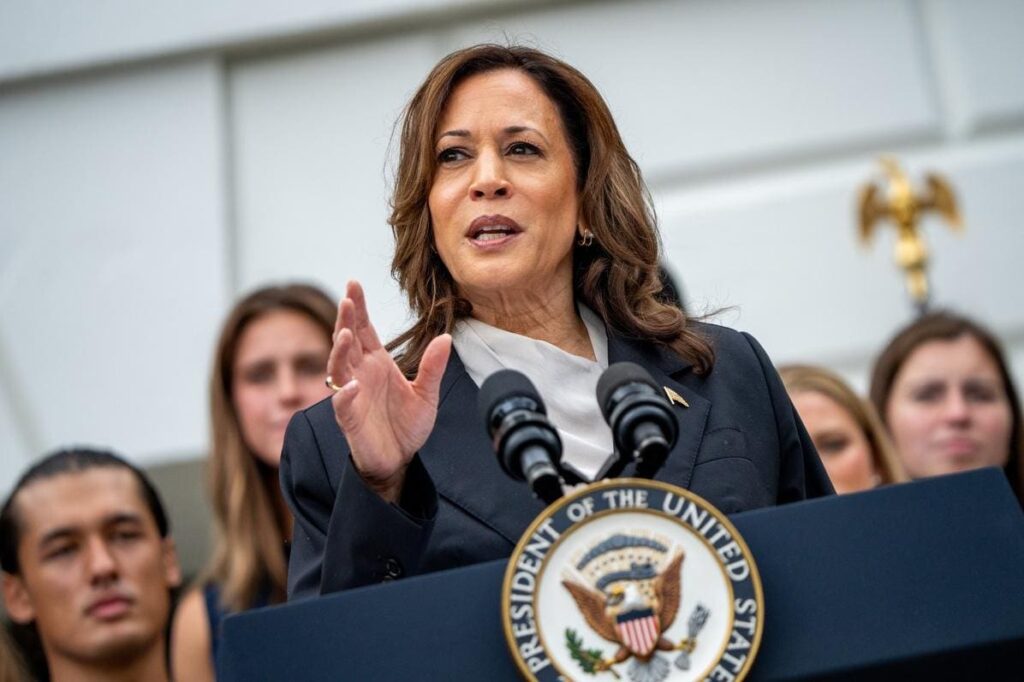WASHINGTON, DC – JULY 22: Kamala Harris speaks on the South Lawn of the White House. (Photo by … (+)
There are two major events that could happen in 2024 that could prove beneficial for blockchain investors and the future of technology innovation in the United States. First, the Supreme Court’s reversal of the 40-year-old “Chevron Doctrine” marks the beginning of a process that will restore greater clarity and consistency to the regulatory environment. Second, the rise of Vice President Kamala Harris to the top of the Democratic ticket presents new opportunities for her and her party to fully embrace the importance and vitality of these industries to the American economy and to build, reset, and cultivate relationships with its top-tier entrepreneurs and innovators.
Cryptocurrencies and other blockchain technologies have weathered a long period of regulatory uncertainty (and persecution), which has had the effect of stifling innovation and driving investment dollars to more welcoming foreign shores. Fortunately, in 2024, both parties are increasingly receptive to the conclusion that these industries have been unfairly demonized by some regulators and politicians, but should instead be encouraged. Democrats should build on their modest but commendable legislative efforts this year to provide blockchain innovators with the regulatory and legal clarity needed to grow their networks and expand their research. If the blockchain economy is allowed to grow to its full potential, the benefits to the American economy will be significant.
At the Democratic convention in Chicago this week, Harris and other party leaders are expected to strongly signal their intention to encourage cooperation across party lines, branches of government, and private sector actors to establish clear and consistent rules to foster the development and proliferation of cutting-edge technologies and, in doing so, help make the United States the center of the next generation of technological development.
It may seem a bit far-fetched that Harris—given her past support for economic proposals associated with the far left—would be willing to support the goals of crypto and other blockchain industries. After all, the fact that she echoed President Biden’s argument that corporate greed and price gouging are factors in inflation suggests she may not be willing to advocate for greater regulatory clarity.
But the media is full of reports and analyses suggesting that Harris is in no way committed to some of the more progressive regulatory positions she expressed during her 2020 presidential campaign, when she was battling Elizabeth Warren and Bernie Sanders for the attention of the party’s base. These are different times, and Harris doesn’t have to worry about competing voices (other than Donald Trump). That would give her ample latitude to position herself at the center of business concerns, particularly on regulation.
Harris has already shown that she is politically savvy enough to change course on a range of issues that are out of step with public opinion, such as fracking, the Green New Deal, and single-payer health care. With that in mind, she should have no trouble announcing that SEC Chairman Gary Gensler will be removed under the Harris administration.
As I described in May, Gensler has waged an old-school progressive legal war against cryptocurrencies over the past four years in an effort to get judges to expand the SEC’s authority far beyond what the law provides. That hasn’t gone well for Gensler and has caused embarrassment for the administration. Judges in various federal courts have issued scathing opinions calling the SEC’s anti-crypto actions “arbitrary and capricious” or “lacking fidelity to the law.”.“In one of Gensler’s crypto lawsuits, a judge sanctioned the SEC for its “flagrant abuse of power.”
One of Gensler’s biggest embarrassments could serve as a warning to Harris. The SEC’s court defeat against Ripple Labs over the company’s sales of the digital asset XRP cost it hundreds of millions of dollars over four years, despite no fraud being alleged and no victims being identified. Ultimately, the judge found that most of Ripple’s XRP sales were not securities and rejected the SEC’s requests for restitution. The $125 million civil penalty she ordered for a narrow set of Ripple’s unregistered sales — where no investors lost money — was only half of the $200 million in litigation costs the company would have had to pay.
The Democratic Party is showing signs of growing receptiveness to the idea that regulations should be more amenable to the language of Congress than to the whims of less accountable, court-approved, four-year regulatory agencies. A younger generation of Democrats—many from states with booming tech industries—want to push bipartisan legislation to establish new rules for industries that shouldn’t be regulated by agencies ill-suited to handling digital assets. The pro-crypto camp is led by House members Ritchie Torres (D-NY), Ro Khanna (D-CA), and Wiley Nickel (D-NC). They have recruited Adam Schiff, the Democratic candidate for U.S. Senate in Harris’ home state, and Senate Majority Leader Chuck Schumer to their cause and formed a group called “Crypto4Harris.”.“They want Harris to sign on to a bipartisan regulatory framework that Schumer says could become law by the end of this year.
Whoever controls the levers of government over the next four years will have a huge influence on the future of cryptocurrencies and other blockchain technologies. But unlike so many other issues, the partisan lines on cryptocurrencies and blockchain are blurring. Investing in sound policies to foster the growth of innovative, game-changing industries is an idea that transcends partisanship. Kamala Harris is expected to make that point this week.

